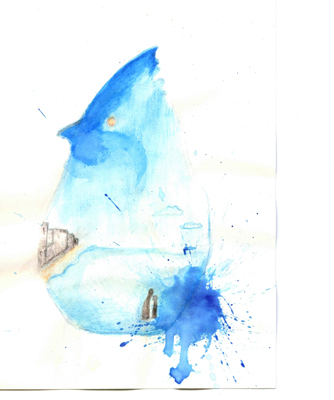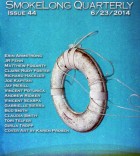Herman was sitting in his fiction workshop, watching Adrienne draw birds in her notebook. She sat to his left, angled away from him and spread flat across the table like something spilled: her head resting on her left arm, her right hand holding the pen she used to draw.
This was an undergraduate fiction workshop. The students were pale and serious-minded people in their very early twenties. They furrowed their brows and rubbed their faces and used words like “metatextual.” “My story tonight is meant as a sort of metatextual critique of our collective moment…” Except for Adrienne, who drew birds in her notebook, and who favored the sort of clothing—pastel scarves, flannel bajas, peasant skirts and blouses with tassles—that rippled behind her as she walked so that her arrival each day was a sort of small parade. And except for Herman, who sat to Adrienne’s left and could not focus on what was happening around him, and who shifted his focus across the room, now, out the window, which overlooked the city’s downtown and the lake spread behind it, out to the dim horizon. Everything you are doing right now is stupid, said the lake.
Adrienne was still staring at her notebook, sketching a branch for a cardinal to perch on. She added leaves to the branch, and veins to the leaves, and her pen moved quickly, and her face was a very still pond in which Herman wanted to see his reflection and so, before he could think, he lifted himself from his chair and leaned across the table to whisper, “I like your birds.” He held his face near her ear for a second—she smelled rich and herbal, like something pulled from a garden—and then fell back into his chair. Before this, he’d only spoken with her a few times after class. How are you, he would say. Okay, she’d say back. Nice day, huh. Yep.
But he did like her birds: they looked like birds, their features precise and expressive. Her jays were humorless. Her ducks sweet and serene. Her ravens up to something. Each day he sat in his fiction workshop and half-listened to the people around him and each day he meant to whisper something to Adrienne, who sat to his left and drew birds in her notebook. But he wished, now, that he had something better than his words: they seemed like leaky little boats that sank beneath the weight of what he wanted them to carry. He liked her birds, but he didn’t just like her birds: he liked that she sat in class and drew pictures while the people around her spoke in grave voices about authorial presence and micromovements and how much voice is too much voice? and he liked her clothes that poured from her body like tapestried water, and he liked her earrings shaped like crescent-moons and the way she tapped her pencil eraser against her cheek when she wasn’t drawing, and he liked the stories she turned in—one about a man walking through the woods who pauses to watch a caterpillar climb a tree, another about a girl lying on the beach who reaches out her hand to touch the lapping water—and he liked what all of this might say about her.
But you couldn’t express this. Not really. It was like swimming from the bottom of a deep lake only to find the surface frozen over. No one has the words, not really, to give voice to the things that make them ache, but there’s nothing else but to try. And so you try, and fuck it up, and hope that the person listening is intuitive or generous enough to understand what you mean when you whisper to her about birds. In this way we are all ridiculous. In this way we betray with our imperfect words the things that most concern us, over and over again, until our thoughts and feelings shrink to fit inside our expressions of them. This was how it felt to Herman.
But Adrienne looked up from her notebook, then, arrested Herman with her half-shut eyes. She opened her mouth and Herman leaned towards her, angled his ear so she could funnel her voice into it, and what he wanted, more than anything, was to be past this, somehow, this initial contact, this dumping of words at her doorstep; what he wanted was to be out the window with her, out of the classroom and past the downtown buildings and at the lake and the beach—even though it was fall, even though it was too cold for the beach—he wanted to be in the water with her, to be cold and wet and beyond words with her, and for the only thoughts in either of their heads to be, Let’s get warm, come sit by me, I am cold and wet, let’s get warm.



 The core workshop of SmokeLong Fitness is all in writing, so you can take part from anywhere at anytime. We are excited about creating a supportive, consistent and structured environment for flash writers to work on their craft in a community. We are thrilled and proud to say that our workshop participants have won, placed, or been listed in every major flash competition. Community works.
The core workshop of SmokeLong Fitness is all in writing, so you can take part from anywhere at anytime. We are excited about creating a supportive, consistent and structured environment for flash writers to work on their craft in a community. We are thrilled and proud to say that our workshop participants have won, placed, or been listed in every major flash competition. Community works.